HVAC Companies Chailey
Find Heating and Cooling Services in Chailey
Get up to 3 Air Conditioning Services quotes for your project today! Compare profiles, reviews, accreditations, portfolio, etc... and choose the best offer.

OAC Services
52 reviewsHastings, GBOAC Space is a company with over 40 years of interior build experience, providing a range of services including construction, mechanical, electrical, fitout, lighting, and furniture. We work closely with clients to understand their vision and create inspiring environments for working, leisure, or retail. Our process is transparent and efficient, ensuring a smooth production process and successful project completion. We care passionately about delivering exceptional results and have a reputation for being professional, efficient, creative, and hardworking.
- Services
- Why Us?
- Testimonials
- Gallery
Get Quote
HSJ Heating
Hastings, GBHSJ Heating are expert heating and plumbing engineers covering Sussex and surrounding counties. We take pride in ensuring your home is comfortable and your heating system is running efficiently. With a decade of experience, we specialise in professional central heating installation, boiler installation and maintenance services. Our dedicated Gas Safety Registered team is committed to providing a high quality service and craftmanship to keep your home warm and your hot water flowing smoothly.
- Services
- Why Us?
- Gallery
Get Quote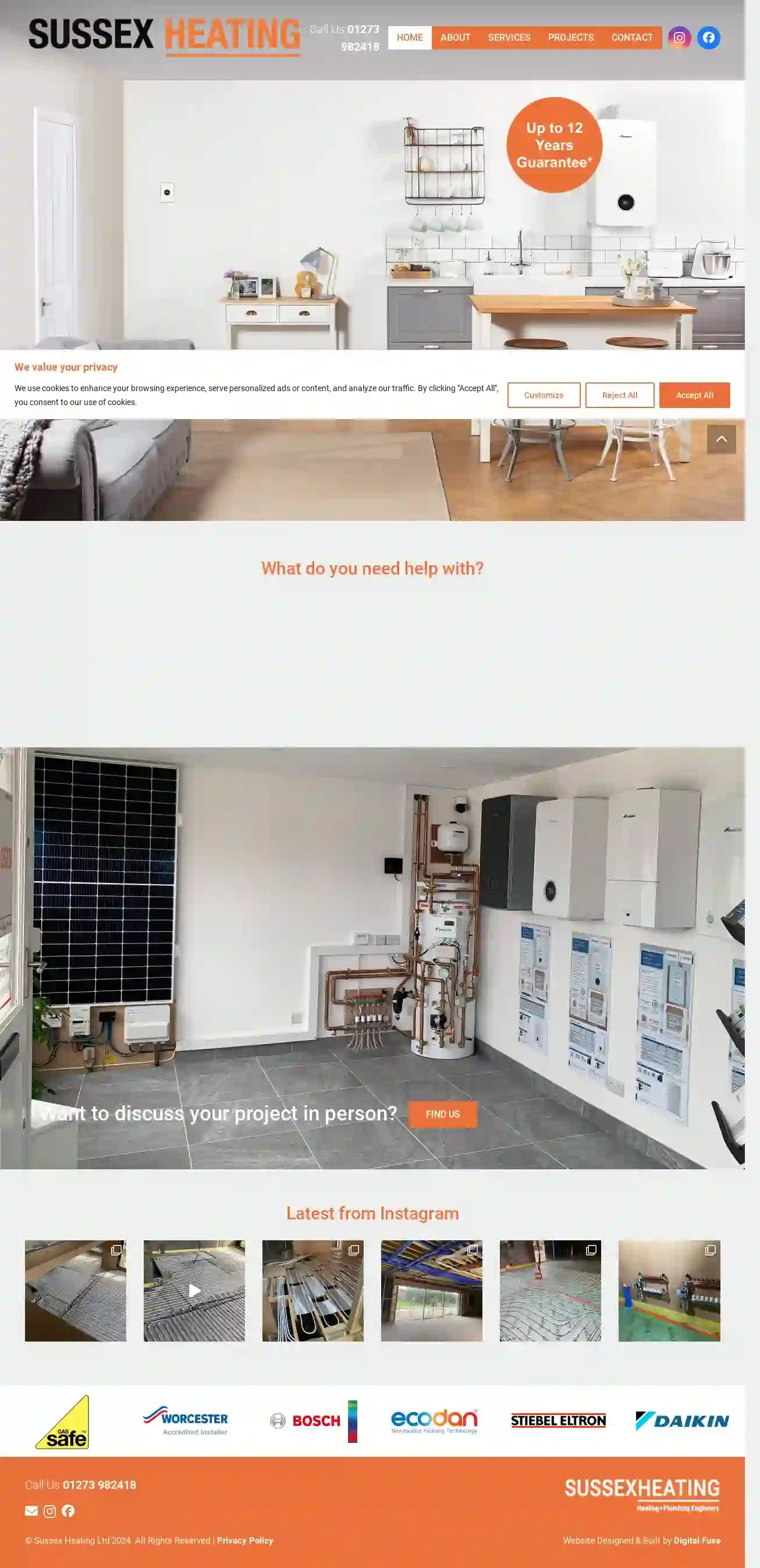
SUSSEX HEATING LTD
510 reviewsHastings, GBSussex Heating Ltd is a local heating company based in Sussex, UK. We specialise in providing high-quality heating solutions for both domestic and commercial properties. Our team of experienced engineers is dedicated to delivering exceptional customer service and ensuring your complete satisfaction. We offer a wide range of services, including the installation, repair, and maintenance of boilers, hot water cylinders, heat pumps, underfloor heating, and solar panels. Whether you're looking for a new heating system or need repairs to your existing one, Sussex Heating Ltd is here to help.
- Services
- Why Us?
- Gallery
Get Quote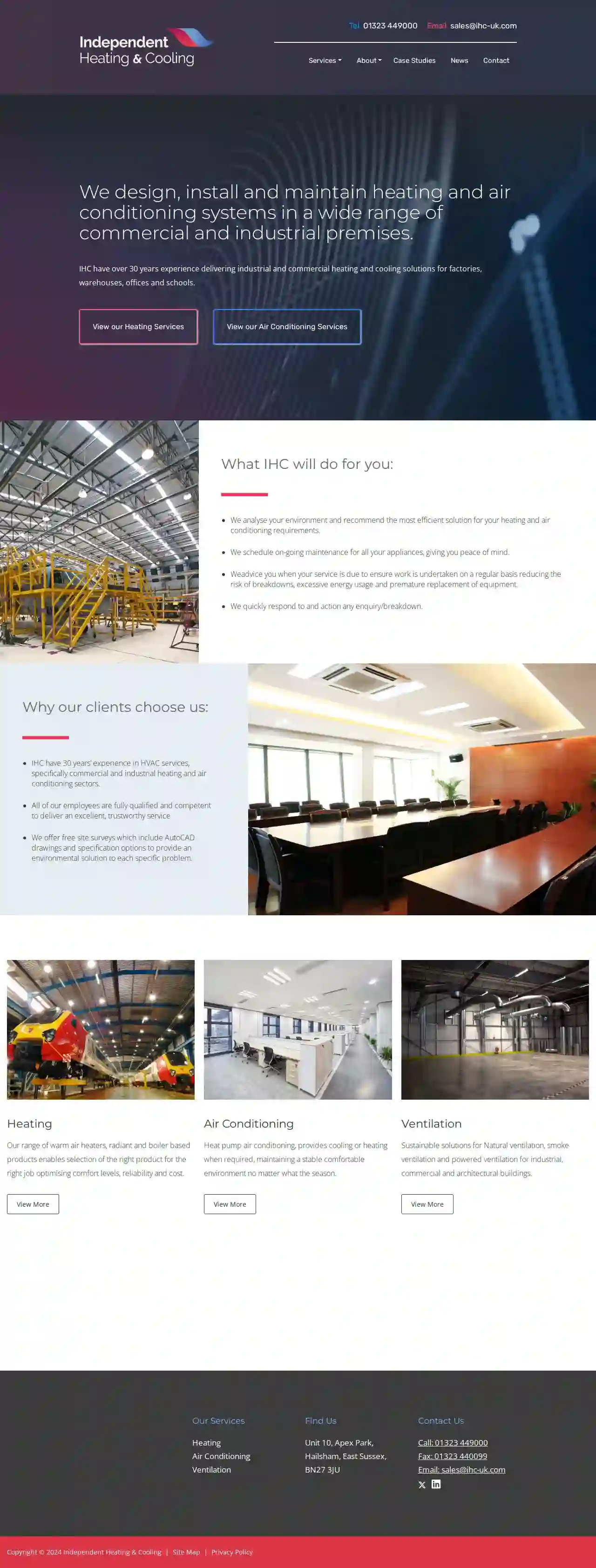
Independent Heating & Cooling
51 reviewsUnit 10, Apex Park, Hailsham, BN27 3JU, GBIndependent Heating & Cooling (IHC) is a company with over 30 years of experience providing heating and air conditioning solutions for commercial and industrial clients. They specialize in designing, installing, and maintaining a wide range of systems, including warm air heaters, radiant heating, boilers, air curtains, heat pump air conditioning, and various ventilation systems. IHC serves a variety of sectors such as factories, warehouses, offices, and schools. IHC prides itself on its team of fully qualified and competent employees who deliver a trustworthy service. They offer free site surveys with AutoCAD drawings and specification options to ensure each client receives a tailored environmental solution.
- Services
- Why Us?
- Gallery
Get Quote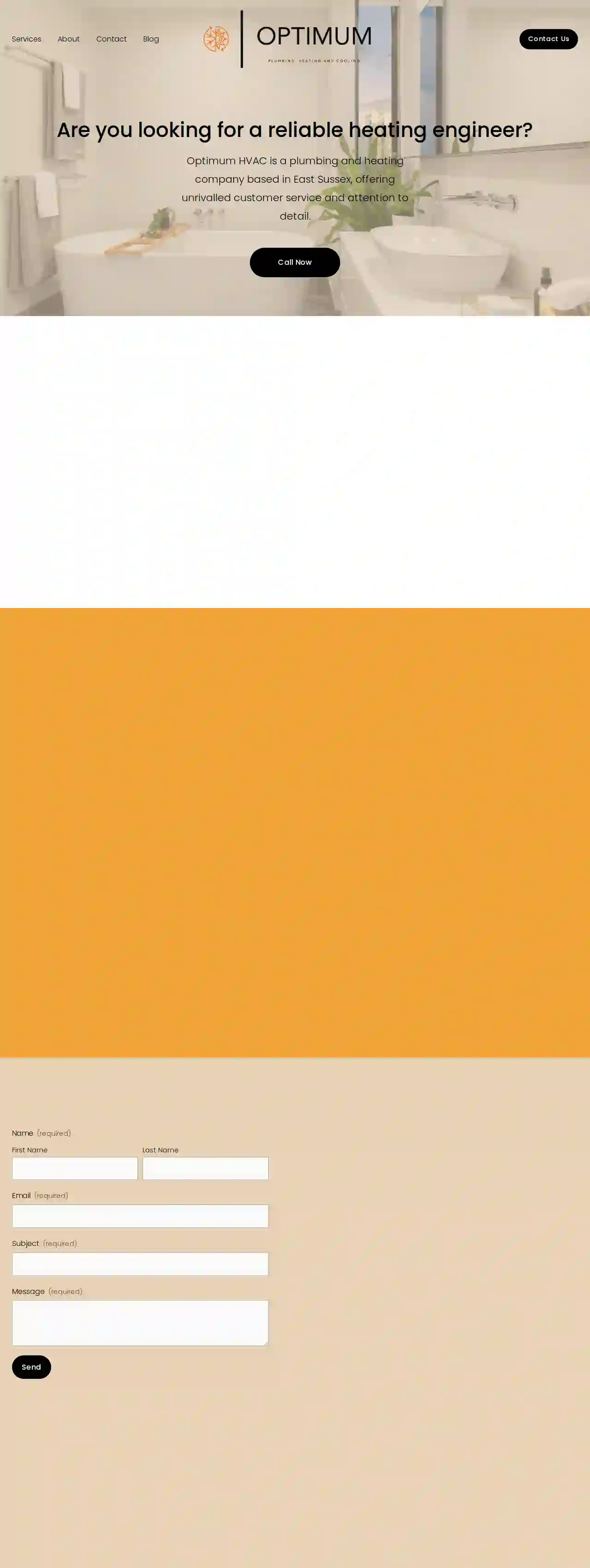
Optimum HVAC
530 reviewsHastings, GBOptimum HVAC is a plumbing and heating company based in East Sussex, offering unrivalled customer service and attention to detail. We have been a trusted name in the plumbing and heating industry for over 12 years. What sets us apart is our deep-rooted passion for this field, which we have nurtured since a young age. I personally became involved in plumbing and heating at the tender age of 16, having been inspired by the work of a skilled plumber on the popular show "Homes Under the Hammer." This early fascination led me to start my own business at just 19 years old, and I have been dedicated to providing exceptional service ever since. Our team at Optimum HVAC takes pride in being the go-to engineers for finding solutions to complex problems that others struggle to resolve. We thrive on challenges and are relentless in our pursuit of perfection. With our wealth of experience and unwavering commitment, you can trust us to deliver the perfect solutions for all your plumbing, heating and cooling needs.
- Services
- Why Us?
- Accreditations
- Our Team
- Gallery
Get Quote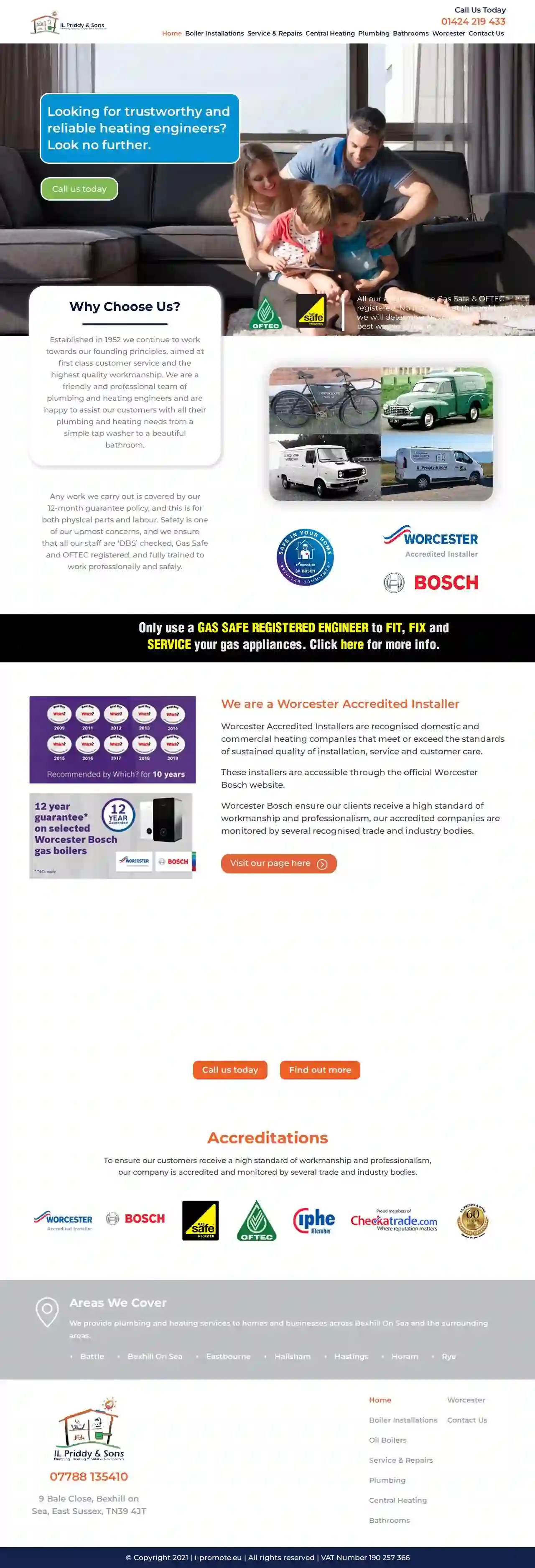
I L Priddy & Sons
3.811 reviews9 Bale Close, Bexhill on Sea, TN39 4JT, GBLooking for trustworthy and reliable heating engineers? Look no further. Call us today. All our engineers are Gas Safe & OFTEC registered. No matter what the problem is, we will determine the cause and find the best way to repair it. Why Choose Us? Established in 1952 we continue to work towards our founding principles, aimed at first class customer service and the highest quality workmanship. We are a friendly and professional team of plumbing and heating engineers and are happy to assist our customers with all their plumbing and heating needs from a simple tap washer to a beautiful bathroom. Any work we carry out is covered by our 12-month guarantee policy, and this is for both physical parts and labour. Safety is one of our upmost concerns, and we ensure that all our staff are ‘DBS’ checked, Gas Safe and OFTEC registered, and fully trained to work professionally and safely. Only use a GAS SAFE REGISTERED ENGINEER to FIT, FIX and SERVICE your gas appliances. Click here for more info. We are a Worcester Accredited Installer Worcester Accredited Installers are recognised domestic and commercial heating companies that meet or exceed the standards of sustained quality of installation, service and customer care.These installers are accessible through the official Worcester Bosch website. Worcester Bosch ensure our clients receive a high standard of workmanship and professionalism, our accredited companies are monitored by several recognised trade and industry bodies. Visit our page here We offer you the highest quality workmanship and services Our Services Include: Bathroom Refurbishments Burst Pipes Central Heating Installations Emergency Plumbers Energy Efficient Advice Gas Boiler Installations Gas Boiler Repairs Gas Boiler Breakdowns Gas Cookers & Hobs Gas Safety Inspections General Plumbing Immersion Tanks Landlord Safety Certificates Powerflushing Replacements and Repairs Replacement Radiators Solar Hot Water Underfloor Heating Call us today Find out more Accreditations To ensure our customers receive a high standard of workmanship and professionalism, our company is accredited and monitored by several trade and industry bodies. Areas We Cover We provide plumbing and heating services to homes and businesses across Bexhill On Sea and the surrounding areas. Battle Bexhill On Sea Eastbourne Hailsham Hastings Horam Rye
- Services
- Why Us?
- Accreditations
- Gallery
Get Quote
Daniel Heating Ltd
51 reviewsBramlea, Balcombe Green, Sedlescombe, TN33 0QL, GBDaniel Heating Ltd is a family run business with over 28 years of experience providing plumbing, heating and renewable energy solutions to the public. We are Gas Safe registered and fully insured, offering a comprehensive range of services including boiler installations, central heating systems, underfloor heating, bathrooms, power showers, power flushing, solar hot water systems and landlord certificates. We pride ourselves on delivering an excellent level of service and providing professional advice to all our customers. We understand that a comfortable home is essential, and that's why we strive to provide reliable and efficient heating solutions. Central heating ensures that your entire house is warm, and not just the room that you're in, so that you can feel free to move around your home without fear of the biting cold. Central heating is the even distribution of heat throughout your home from a central heat source. Warm water distributes heat evenly to every room in your house through the use of a network of pipes. Even if you live in an area where the temperature is moderately warm, your home can become very cold in the winter months because of insufficient insulating and ineffective heating systems. This can lead to uneven temperatures throughout your home and can result in an unhealthy living environment. At Daniel Heating Ltd we specialise in the installation of central heating systems and boilers, however we also deal with a number of other services. We provide all of our customers with an excellent level of service and also are happy to offer professional advice. We cover Hastings, Bexhill, Battle and the surrounding areas of East Sussex.
- Services
- Why Us?
- Our Team
- Gallery
Get Quote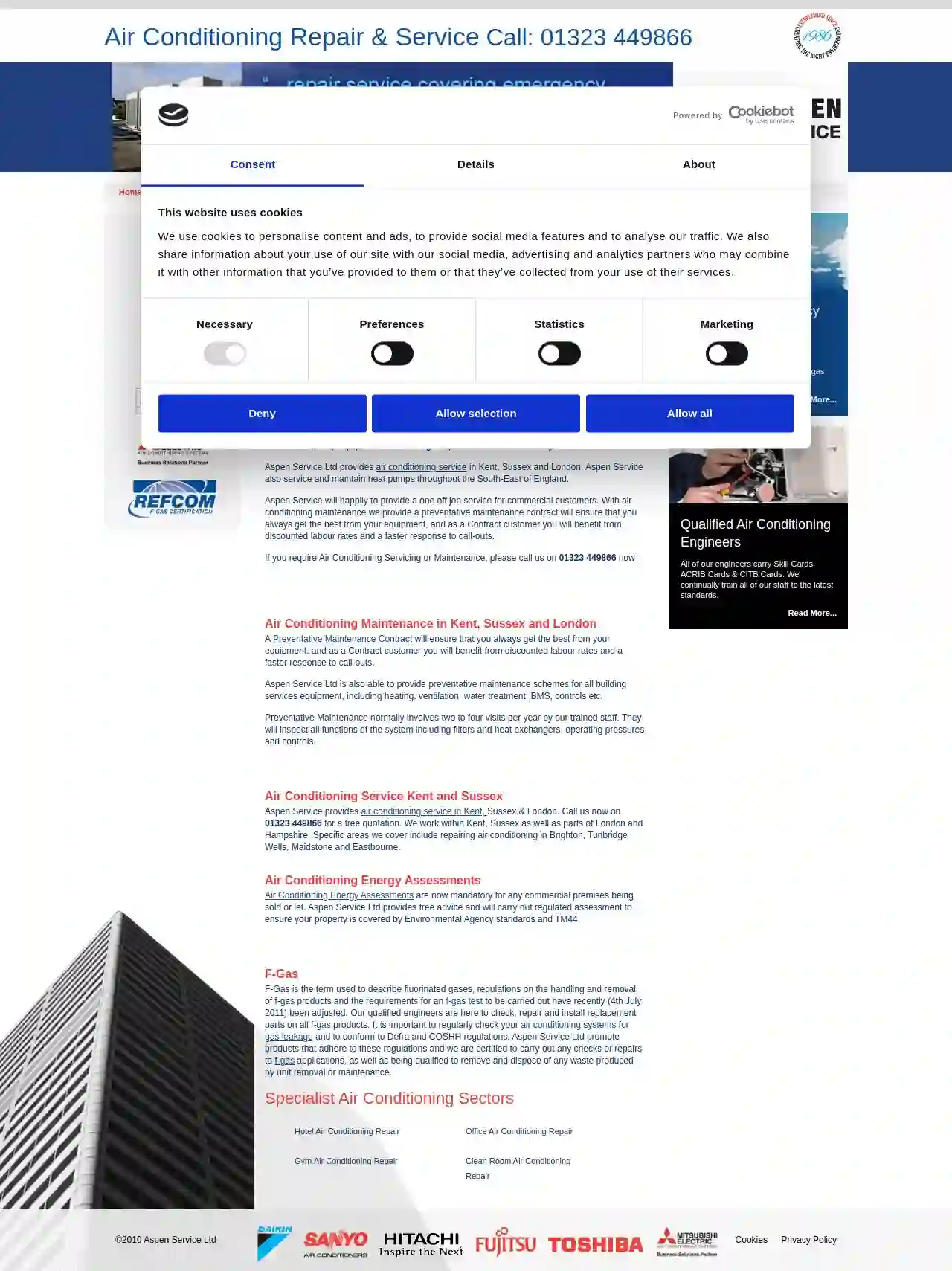
Aspen Service
Apex Way, Hailsham, BN27 3WA, GBAspen Service Ltd is part of The Aspen Group and was initially set-up to ensure our customers have a dedicated team dealing purely with the Service and maintenance of air-conditioning systems and heat pumps. Servicing commercial and domestic customers throughout East Sussex, West Sussex and Kent as well as parts of London, Surrey and Hampshire, Aspen Service now provide air conditioning service and maintenance for commercial organisations and sub contract for other reputable companies throughout the South-East. Aspen Service have trained engineers certified in the service and maintenance of all commercially popular air conditioning systems and heat pump systems, certificated and regulated to perform all required repairs to the following; Commercial air conditioning systems, Commercial and domestic air source heat pumps, Commercial and domestic ground source heat pumps. Aspen Service are dedicated to providing a superior service by using the latest technology for both its equipment and general day to day running of its administration, health and safety and communications. Established in 1986, we have been repairing, servicing and producing preventative maintenance agreements on behalf of customers for Aspen AC. Our sister company Aspen AC deals with the design and installation of air conditioning systems and units with Aspen Service in control of the repair and preventative maintenance of air conditioning systems for all commercial and residential applications. Aspen Renewables deal with the design and installation of all heat pump systems; both air source heat pumps and ground source heat pumps as well as solar PV installation with Aspen Service providing the repair and maintenance of the heat pump products.
- Services
- Why Us?
- Accreditations
- Gallery
Get Quote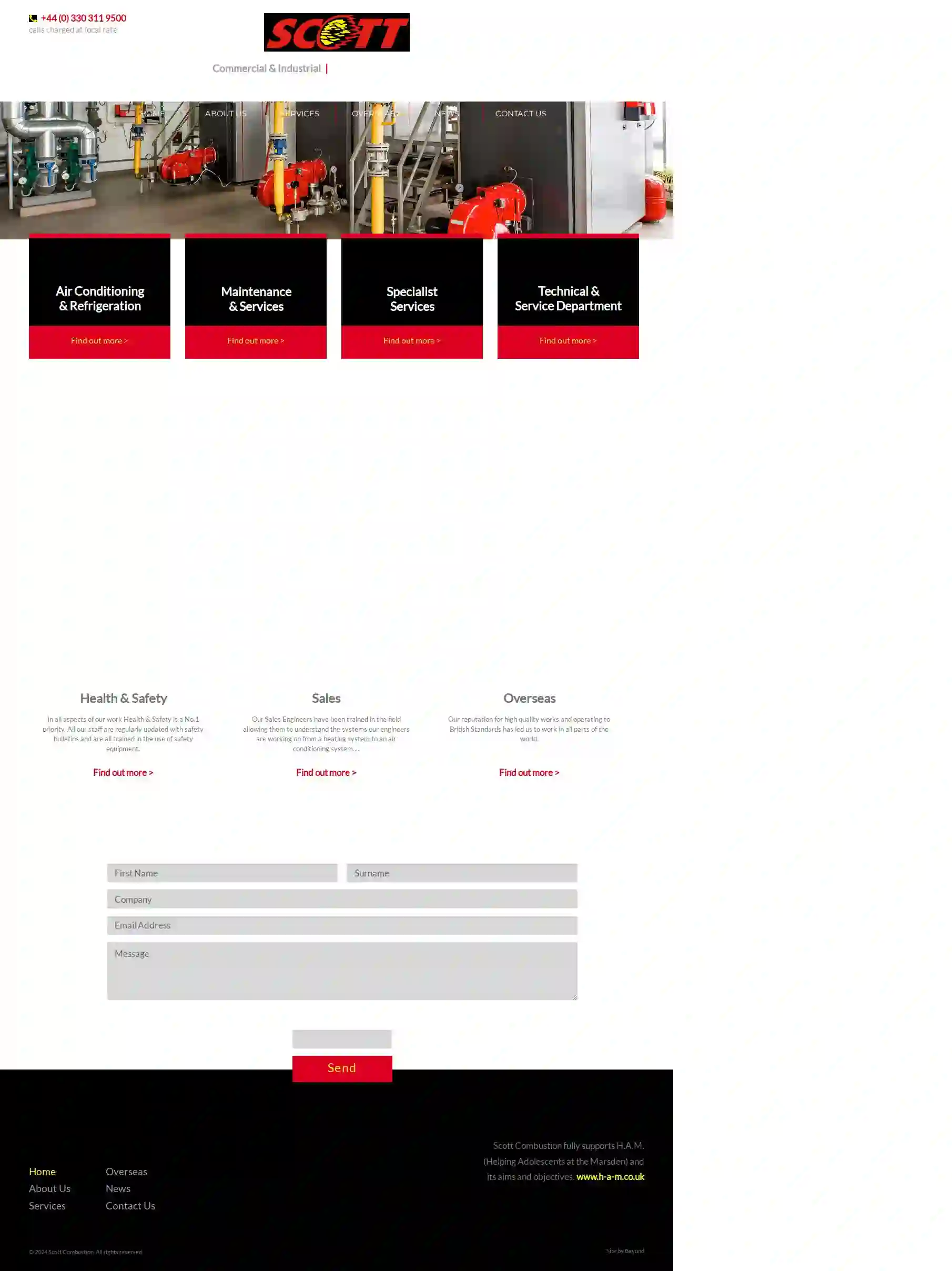
Scott Combustion Limited
3.73 reviewsHastings, GBScott Combustion is a premium commercial and industrial building services maintenance and installation company. Operating throughout the world, we are equipped with specialist divisions for gas and oil boiler servicing, general gas works, air conditioning/refrigeration and electrical installation and testing. Since its establishment in 1980, Scott Combustion has been providing expert services true to its proficient reputation and has now expanded to operate all over the world, having completed contracts in China, Nigeria, Georgia, Armenia, Japan, Latvia, Sierra Leone, Cameroon, Senegal, Azerbaijan, Venezuela and many other countries. Our aim is to alleviate the strains generated by building service concerns, to ensure our clients can operate their companies or organisations without additional complication. Through our swift and efficient service, everyday problems are solved to leave our clients at ease. Scott Combustion is part of the Scott Group of Companies affording our clients access to a range of specialist services within the building services field. We offer a full range of building services – from the servicing of a gas/oil boiler, the chlorination of a water system to air conditioning and refrigeration services. We provide our clients with an exclusive service to manage every potential problem in the building operations sphere. Health & Safety is a No.1 priority. All our staff are regularly updated with safety bulletins and are all trained in the use of safety equipment. Our Sales Engineers have been trained in the field allowing them to understand the systems our engineers are working on from a heating system to an air conditioning system. Our reputation for high quality works and operating to British Standards has led us to work in all parts of the world. We fully support H.A.M. (Helping Adolescents at the Marsden) and its aims and objectives.
- Services
- Why Us?
- Gallery
Get Quote
Sussex Air Conditioning & Heat Pumps Ltd
55 reviewsHastings, GBWith over 20 years experience, we provide skills & knowledge to guarantee a stress free service from Concept to Completion.For Air Conditioning or heat pumps at work or at home, we advise you on the best products for your needs. We carry out a full site survey and install or service your equipment to the highest standards, providing affordable heating & cooling all year round.
- Services
- Why Us?
- Testimonials
- Gallery
Get Quote
Over 12,692+ HVAC Companies onboarded
Our HVAC experts operate in Chailey and surrounding areas!
HVACCompaniesHub has curated and vetted the Best HVAC Companies in Chailey. Find the most reliable pro today.
Frequently Asked Questions About HVAC Companies
- Warm Air: The most noticeable sign is that the AC is blowing warm or lukewarm air.
- Ice Buildup: Ice may form on the refrigerant lines or evaporator coil.
- Increased Energy Bills: Your system has to work harder to cool, leading to higher energy consumption.
- Hissing or Bubbling Sounds: These sounds may suggest a refrigerant leak.
How often should I have my HVAC system serviced?
What are the signs my air conditioner needs refrigerant?
What is a ductless mini-split system?
What are the benefits of a programmable thermostat?
How often should I have my HVAC system serviced?
What are the signs my air conditioner needs refrigerant?
- Warm Air: The most noticeable sign is that the AC is blowing warm or lukewarm air.
- Ice Buildup: Ice may form on the AC unit.
- Increased Energy Bills: Your system has to work harder to cool, leading to higher energy consumption.
- Hissing or Bubbling Sounds: These sounds may suggest a refrigerant leak.